新闻热词英语表达系列之1:“春运”
春运英语表达方式
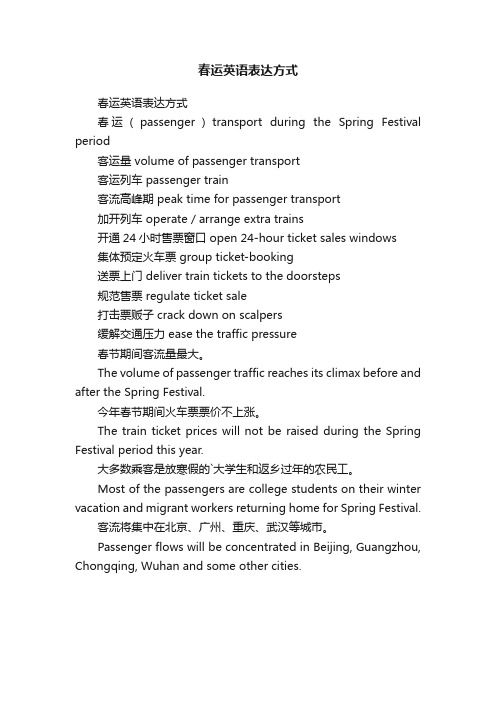
春运英语表达方式春运英语表达方式春运(passenger)transport during the Spring Festival period客运量 volume of passenger transport客运列车 passenger train客流高峰期 peak time for passenger transport加开列车 operate / arrange extra trains开通24小时售票窗口 open 24-hour ticket sales windows集体预定火车票 group ticket-booking送票上门 deliver train tickets to the doorsteps规范售票 regulate ticket sale打击票贩子 crack down on scalpers缓解交通压力 ease the traffic pressure春节期间客流量最大。
The volume of passenger traffic reaches its climax before and after the Spring Festival.今年春节期间火车票票价不上涨。
The train ticket prices will not be raised during the Spring Festival period this year.大多数乘客是放寒假的`大学生和返乡过年的农民工。
Most of the passengers are college students on their winter vacation and migrant workers returning home for Spring Festival.客流将集中在北京、广州、重庆、武汉等城市。
Passenger flows will be concentrated in Beijing, Guangzhou, Chongqing, Wuhan and some other cities.。
“春运”英语怎么说
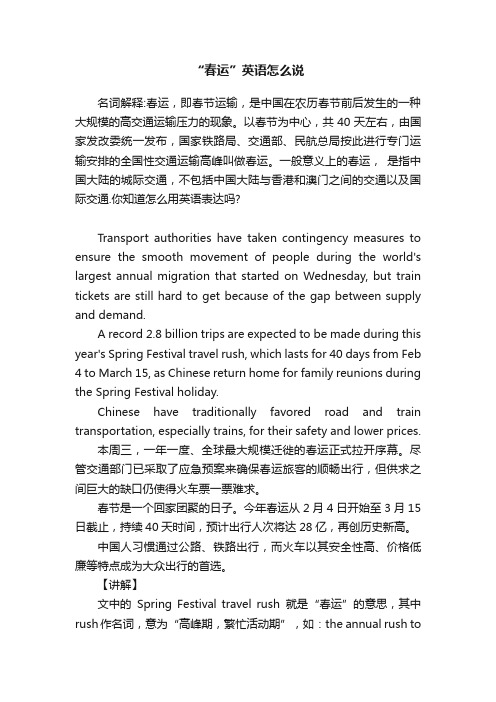
“春运”英语怎么说名词解释:春运,即春节运输,是中国在农历春节前后发生的一种大规模的高交通运输压力的现象。
以春节为中心,共40天左右,由国家发改委统一发布,国家铁路局、交通部、民航总局按此进行专门运输安排的全国性交通运输高峰叫做春运。
一般意义上的春运,是指中国大陆的城际交通,不包括中国大陆与香港和澳门之间的交通以及国际交通.你知道怎么用英语表达吗?Transport authorities have taken contingency measures to ensure the smooth movement of people during the world's largest annual migration that started on Wednesday, but train tickets are still hard to get because of the gap between supply and demand.A record 2.8 billion trips are expected to be made during this year's Spring Festival travel rush, which lasts for 40 days from Feb 4 to March 15, as Chinese return home for family reunions during the Spring Festival holiday.Chinese have traditionally favored road and train transportation, especially trains, for their safety and lower prices.本周三,一年一度、全球最大规模迁徙的春运正式拉开序幕。
尽管交通部门已采取了应急预案来确保春运旅客的顺畅出行,但供求之间巨大的缺口仍使得火车票一票难求。
英语六级翻译练习:春运
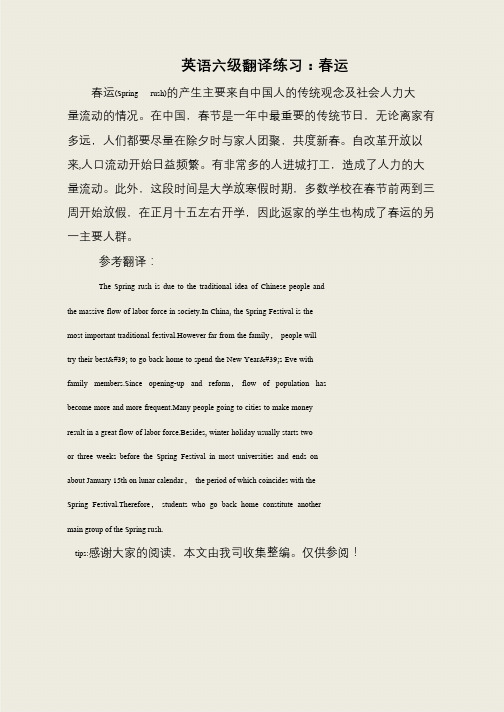
英语六级翻译练习:春运春运(Spring rush)的产生主要来自中国人的传统观念及社会人力大量流动的情况。
在中国,春节是一年中最重要的传统节日,无论离家有多远,人们都要尽量在除夕时与家人团聚,共度新春。
自改革开放以来,人口流动开始日益频繁。
有非常多的人进城打工,造成了人力的大量流动。
此外,这段时间是大学放寒假时期,多数学校在春节前两到三周开始放假,在正月十五左右开学,因此返家的学生也构成了春运的另一主要人群。
参考翻译:The Spring rush is due to the traditional idea of Chinese people andthe massive flow of labor force in society.In China, the Spring Festival is themost important traditional festival.However far from the family,people willtry their best' to go back home to spend the New Year's Eve withfamily members.Since opening-up and reform,flow of population hasbecome more and more frequent.Many people going to cities to make moneyresult in a great flow of labor force.Besides, winter holiday usually starts twoor three weeks before the Spring Festival in most universities and ends onabout January 15th on lunar calendar,the period of which coincides with theSpring Festival.Therefore,students who go back home constitute anothermain group of the Spring rush.tips:感谢大家的阅读,本文由我司收集整编。
关于春节的双语阅读
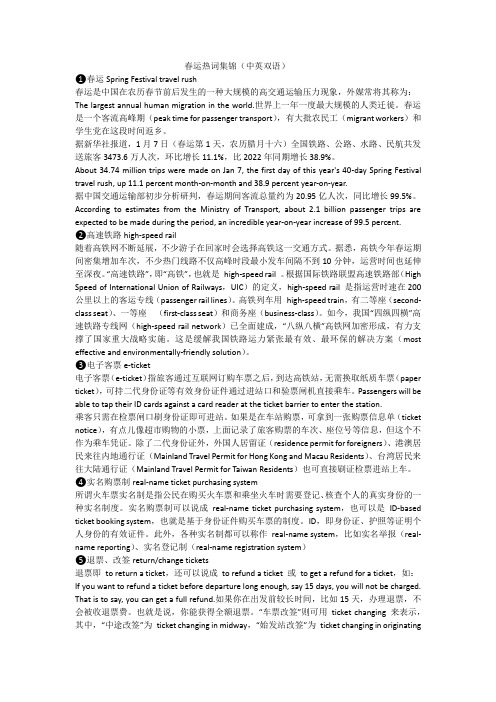
春运热词集锦(中英双语)❶春运Spring Festival travel rush春运是中国在农历春节前后发生的一种大规模的高交通运输压力现象,外媒常将其称为:The largest annual human migration in the world.世界上一年一度最大规模的人类迁徙。
春运是一个客流高峰期(peak time for passenger transport),有大批农民工(migrant workers)和学生党在这段时间返乡。
据新华社报道,1月7日(春运第1天,农历腊月十六)全国铁路、公路、水路、民航共发送旅客3473.6万人次,环比增长11.1%,比2022年同期增长38.9%。
About 34.74 million trips were made on Jan 7, the first day of this year's 40-day Spring Festival travel rush, up 11.1 percent month-on-month and 38.9 percent year-on-year.据中国交通运输部初步分析研判,春运期间客流总量约为20.95亿人次,同比增长99.5%。
According to estimates from the Ministry of Transport, about 2.1 billion passenger trips are expected to be made during the period, an incredible year-on-year increase of 99.5 percent.❷高速铁路high-speed rail随着高铁网不断延展,不少游子在回家时会选择高铁这一交通方式。
据悉,高铁今年春运期间密集增加车次,不少热门线路不仅高峰时段最小发车间隔不到10分钟,运营时间也延伸至深夜。
春运相关英语词组

春运the Spring Festival travel rush阖家团圆family reunion反向春运reverse Spring Festival travel人山人海huge crowds of people全球一年一度的最大规模人类迁徙world’s largest annual human migration 公共交通系统public transportation system网上订票系统online ticket booking system实名购票制real-name ticket purchasing system高铁系统high-speed railway system高铁运营里程high-speed railway operational length电子收费设备electronic toll-collection devices半价优待eligible for half-price policy列车时刻表train schedules抢票软件ticket-snatching software抢票插件ticket-buying plug-in个人身份证personal identity cards人脸识别技术facial recognition technology车票改签ticket changing候补购票服务waitlist function电子客票electronic tickets纸质客票paper tickets折扣票discount tickets补票pay for ticket extension黄牛scalper/ticket tout倒票ticket scalping囤票hoard tickets正点率on-schedule rate抢占座位的人seat robber硬卧hard sleeper/berth软卧soft sleeper/berth硬座hard seat无座no seat,standing-room-only一等座first-class seat二等座second-class seat经济舱economy class商务舱business class头等舱first class春节Spring Festival春节联欢晚会Spring Festival Gala红包red envelopes年终奖a year-end cash bonus。
“春运”不是SpringTravel,“抢票”不是robticket!说错尴尬

“春运”不是SpringTravel,“抢票”不是robticket!说错尴尬又是一年春运进行时,全球最大人口流动的壮观景象,在中华大地再次上演。
俗话说,有钱没钱,回家过年。
年已近,该抢票的抢票,家中老少都在等你回家。
一、“春运”英语怎么说?说到“春运”,英语怎么表达呢?别告诉我是Spring Travel,老外估计听完一脸懵逼。
其实,“春运”的英文翻译通常为:the Spring Festival travel season 或 Spring Festival travel rush.来看看之前CNN对中国春运的报道,用的是Spring Festival rush。
rush有“热潮,高峰”的含义,从字面看Spring Festival rush是“春节高峰”的意思,不过从整句话的意境,以及“迁徙活动”来看,Spring Festival rush理解为“春运”也没问题。
另外,因为“春运”已经形成一种周期性的现象,所以按我们中文的拼音说“Chunyun”或the Chunyun period,一些老外也可以理解。
二、“抢票”英语怎么说?每年春运,最让人头疼的事就是一票难求!“买到票没?”成了大家在这一期间打招呼的口头禅。
为了一张回家过年的车票,很多人真是费尽苦心。
“抢票”也成为大家一段痛并快乐的经历。
尽管最终不一定能抢到票,很多依然选择一试再试,期待好运气的降临。
这就是“回家”的魅力!那么“抢票”英语又该怎么说呢?同样也不能直译为“rob ticke”,莫非你要打劫车票不行!“抢票”的正确说法是:ticket grabbing我们先来看grab的英语解释:take hold of something or someone suddenly and roughly;翻译成中文是:突然粗暴地抓住某物或某人。
是不是很形象的描绘出大家在抢票时,巴不得一把就将票抢到手的迫切心理。
“抢票”的另外一种说法是:snap up ticketssnap up 表示“抢购”,因价格便宜或正是想要买的东西,而快速下单。
“春运”不是springtransportation,别再这么说了!

“春运”不是springtransportation,别再这么说了!只有自己经历过,才深切地感受到,春运真的开始了。
(其实我只是想炫耀一下,梨子已经回到火锅串串冒菜辣子鸡香肠腊肉钵钵鸡等美食的怀抱了)路上堵多了,机场车站的人也多多了,而且都是大包小包的行李,里面应该装着带给家人的礼物。
我们的回家之路-春运-是每年地球上发生的规模最庞大的人口大迁移,每年都是所有媒体的年终冲击KPI的好助攻。
但义务教育都已经普及这么多年了,居然还看到了有人将“春运”翻译为spring transportation…这就是字面翻译,简单粗暴的直译。
(是偷懒还是怎的?)但“春运”中的春指的是春节,是Spring Festival,而不是春天spring呀喂。
难点在“运”上,某度百科上定义是运输,一种大规模的高交通运输压力的现象。
重点不仅在于运输,而是“高交通运输压力”。
transportation:运输,人或物品的运输还可以表示交通工具、交通运输系统一个transportation太弱了,并不强调运输压力有多大,规模有多大,完全体现不出我们好几亿人的浩瀚气势。
不是transportation,那哪个奇妙的单词会正好撞上春运的腰呢?你想,你细想。
春运是一年中交通运输压力最大的时候,其实我们每天都有不同时段的高交通运输压力,说人话就是早晚下班高峰。
早晚高峰的英语是:rush hourrush: 高峰期早高峰:the morning rush hour晚高峰:the evening rush hour高峰期:rush hourduring/at the morning rush hour所以,“春运”的出行高峰,英语是travel rush,全名是Spring Festival travel rush。
还有一种译法是Spring Festival travel season。
season不仅可以指四季,还可以指一年中某一活动或时间发生的季节。
春运介绍---英文
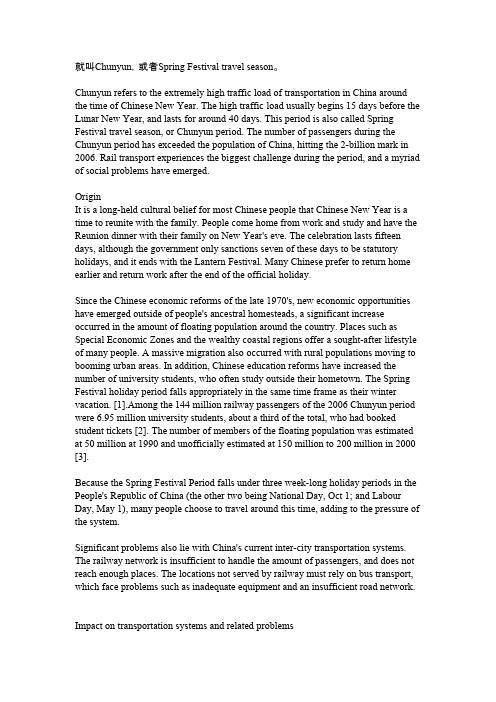
就叫Chunyun,或者Spring Festival travel season。
Chunyun refers to the extremely high traffic load of transportation in China around the time of Chinese New Year. The high traffic load usually begins 15 days before the Lunar New Year, and lasts for around 40 days. This period is also called Spring Festival travel season, or Chunyun period. The number of passengers during the Chunyun period has exceeded the population of China, hitting the 2-billion mark in 2006. Rail transport experiences the biggest challenge during the period, and a myriad of social problems have emerged.OriginIt is a long-held cultural belief for most Chinese people that Chinese New Year is a time to reunite with the family. People come home from work and study and have the Reunion dinner with their family on New Year's eve. The celebration lasts fifteen days, although the government only sanctions seven of these days to be statutory holidays, and it ends with the Lantern Festival. Many Chinese prefer to return home earlier and return work after the end of the official holiday.Since the Chinese economic reforms of the late 1970's, new economic opportunities have emerged outside of people's ancestral homesteads, a significant increase occurred in the amount of floating population around the country. Places such as Special Economic Zones and the wealthy coastal regions offer a sought-after lifestyle of many people. A massive migration also occurred with rural populations moving to booming urban areas. In addition, Chinese education reforms have increased the number of university students, who often study outside their hometown. The Spring Festival holiday period falls appropriately in the same time frame as their winter vacation. [1].Among the 144 million railway passengers of the 2006 Chunyun period were 6.95 million university students, about a third of the total, who had booked student tickets [2]. The number of members of the floating population was estimated at 50 million at 1990 and unofficially estimated at 150 million to 200 million in 2000 [3].Because the Spring Festival Period falls under three week-long holiday periods in the People's Republic of China (the other two being National Day, Oct 1; and Labour Day, May 1), many people choose to travel around this time, adding to the pressure of the system.Significant problems also lie with China's current inter-city transportation systems. The railway network is insufficient to handle the amount of passengers, and does not reach enough places. The locations not served by railway must rely on bus transport, which face problems such as inadequate equipment and an insufficient road network. Impact on transportation systems and related problemsThe most affected modes of transportation are inter-city surface passenger transportation systems, namely railway and road networks. Most Chinese middle-class citizens cannot readily afford air transport. International, urban and waterway transportation are slightly affected [4]. Until 2007, due to the high demand, the prices of tickets are increased during the period[5]. In 2007's Chunyun period (Feb 4-March 14), however, the government imposed strict regulations against inflated prices on railway tickets.Railway and busesThe Ministry of Railways estimated that 156 million passengers would take trains during the 2007 Chunyun period; in other words, 3.9 million passengers per day. However, the average daily capacity of the Chinese railway system is 2.4 million. The shortage of railway resources led many passengers to pay double or even triple-priced tickets from scalpers or to wait in queues for upwards of a days time at railway stations.Chinese railway tickets are simple in natureBecause of the extreme long waiting period, many customers become frustrated and search for solutions to jump the line, often resulting in conflict. Fights over places in line is often seen, and as people get closer to the ticket booth, much pushing and shoving ensue. The overworked ticket booth workers are generally frustrated with the repetitive and dull nature of their work, which, in most places in the country, come in long shifts every time, and therefore reflect a largely negative and frustrated image to the customers. Inquiries by customers are not always answered correctly or at all; customers are not offered many options to begin with, if time is alloted for indecision the customer is usually pushed aside by the next person in line. The same problem is found with phone lines, which saves the anxiety of waiting in line, but are severely overloaded and the reception is often rude when a ticket agent finally picks up after several hours of waiting. In Shenzhen it is estimated that 23 days worth of tickets can be gone in a matter of 14 minutes if telephone was the only method employed. An internet system is present, but at times inadequate.To fit demand, hundreds of "temporary trains" (Linke) and hundreds of thousands of temporary buses are operated during this period, the number of ticket offices is increased and selling periods are extended to cope with the demand, with temporary booths springing up. Batch orders from schools and factories are organized to distribute tickets ahead of time. These measures, however, are generally inadequate and often tampered with. For example, during the 2005 Chunyun period, the ticket offices in Shenzhen had tens of telephone lines, and at times got millions of calls per hour. In the Guangzhou area, the number of calls reached 19.91 million per hour. Guangzhou Railway Group increased the number of telephone lines at their ticket offices to 6,000 in the 2006 Chunyun period.Due to the basic nature of Chinese railway tickets and the loosely set limitations on the number of "standing tickets" (which is basically a pass to get on a crowded railway car), Scalpers (piaofanzi 票贩子 or huangniu 黄牛, lit. yellow cow in Chinese) profit greatly during the Chunyun period. Organizations of scalpers have emerged, and the scalpers inside the sometimes intricate network work collectively to make the most gain out of the tickets. They pick up tickets in great numbers minutes after they go on sale, and then deal them out in and around the railway station at highly inflated prices. A significant problem has also emerged with the illegal dealing of tickets through obselete ticket modification or even printing outright fake tickets using computer technology. Although measures have been put in place to prevent fake tickets, passengers who purchase the tickets become extremely frustrated when the authenticity of their tickets is questioned only upon arrival at the ticket validation officer, what would be minutes before boarding the train. Because of the worsening nature of the problem, the government has issued many warnings and began various campaigns to crack down on the scalpers. Unfortunately, because of the complicated nature of the problem and the social networks which surround the scalper organizations, police and other authorities who are supposed to be in charge of the crackdown often become involved in the illicit acitivity themselves, and take many bribes from the scalpers.There has also developed a significant safety risk during the Chunyun season. Theft, robbery, fraud and other crimes are the most flagarant during the time period. Passenger supervision and checks on luggage become more strict. The common belief in the safety of railway travel is undermined by the fact that many railway cars are severely overcrowded. Bus companies, in order to gain a bigger profit, overwork the bus drivers on irregular schedules, overloading people every round, causing a higher accident rate. Trains also face a problem with scheduling, as an overcrowded network cannot ensure the overall accuracy of train schedules, and some trains are habitually late hours at a time, cause unease and frustration with passengers. The government has taken to passing legislation to regulate late trains, and make a public notice and apology for late trains mandatory.The passenger flow during the Chunyun period is usually imbalanced. Before the Spring Festival, passengers usually gather in developed coastal cities, railway interchange cities such as Beijing and Guangzhou, and basically flow from urban to rural areas. The passenger flow direction is reversed after the Spring Festival. In addition, passenger flow is very sensitive to disruption, such as bad weather [6]. In 2007, round-trip train tickets will be available for college students[7].AirAir transportation is less affected as most travellers are workers who cannot afford air transport, but nevertheless the Chunyun impact is increasing. In 2006 roughly 14 million passengers used air transportation as their method of travel inside China. Xiamen Airlines, for example, added nearly 190 flights to its roster during the Chunyun period, with thirty flights especially placed to Hong Kong and Macau and another ten flights to international destinations in Southeast Asia and Korea. Cross-strait flights between Taiwan and mainland China are also permitted during this period.[8] To prevent accidents in the air, the Chinese government has brought in very strict regulations on not overloading planes. The General Administration of Civil Aviation of China (CAAC) estimates at least 19.3 million passengers will fly during the 2007 Chunyun period[9].参考资料:/wiki/Chunyun。
- 1、下载文档前请自行甄别文档内容的完整性,平台不提供额外的编辑、内容补充、找答案等附加服务。
- 2、"仅部分预览"的文档,不可在线预览部分如存在完整性等问题,可反馈申请退款(可完整预览的文档不适用该条件!)。
- 3、如文档侵犯您的权益,请联系客服反馈,我们会尽快为您处理(人工客服工作时间:9:00-18:30)。
新闻热词英语表达系列之1:“春运”
“春运”的英文表达是Spring Festival travel rush。
中国的“春运”被誉为人类历史上规模最大的、周期性的人类大迁徙。
2013年春运从1月26日开始,至3月6日结束,共计40天。
中国的“春运”被誉为人类历史上规模最大的、周期性的人类大迁徙。
2013年春运从1月26日开始,至3月6日结束,共计40天。
官方估计,在40天的春运期间,旅客将达到31亿人次。
我们来看一段相关的英文报道
The Spring Festival travel rush is known as the biggest movement of humanity in the world.The official estimate on numbers of passenger trips to be made in the 40-day period surrounding the holiday is 3.1 billion.To ensure a smooth journey for every passenger, railway departments have adopted various measures, including servicing more temporary trains, more tickets booths, longer working hours and an online ticket purchasing system.
中国的春运,被认为是每年世界上最大型迁徙。
官方估计,在40天的春运期间,旅客将达到31亿人次。
为了确保每位旅客旅程的顺利,铁路部门采取了各种措施,包括提供更多的临时列车、更多的售票窗、更长的工作时间和网上购票系统。
【讲解】"Spring Festival travel rush"即为“春运”,除了春节,让交通部门特别繁忙的时候还有National Day放的长假,这两个节日的连续七天休假均称为golden week(黄金周)。
"online ticket purchasing system"可译为"网上购票系统",今年国内多家浏览器公司推出插件
(plug-in),这些插件可以帮助用户更容易能买到票,但是也引起颇多争议。
